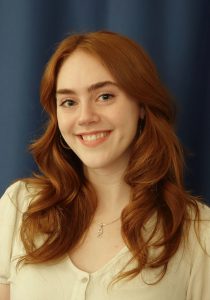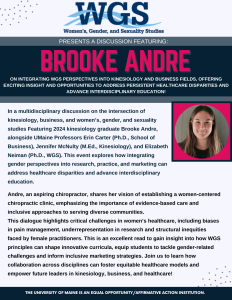Courtney Harding
WGS INTERN Fall 2024
GETTING TO KNOW INTERN:
Courtney Harding (she/her) is a University of Maine student double-majoring in Women’s
Gender Studies and Psychology. Her studies originated in the Criminal Justice fields, with an
interest in working in the court systems. She is very passionate about advocating for injustices,
especially of legal and social nature, which is why her focus of studies developed into Women’s
Gender Studies and Psychology, as they are often recognized to share many parallels, such as
how individuals across many circumstances, such as social and psychological, can be better
recognized through understanding of many perspectives. Throughout her learning in these two
subjects, and her understanding of how the two concepts interact with each other, Courtney has
an abundance of knowledge pertaining to the importance these fields present in society, as to
thoroughly understand the perspectives and minds of others, it is also important to be attuned to
one’s own perspective.
Courtney’s academic interests predominantly pertain to challenging gender stereotypes
through Psychology, as it relates to Women’s Gender Studies, helping deconstruct harmful
stereotypes that limit individuals based on gender. Challenging such issues will ensure a future
of more inclusive and diverse representations in areas of the world such as the media,
education, and workplaces, further working to foster environments where all genders can thrive
without the constraints of traditional roles.
Furthermore, Courtney is also interested in the improvement of mental health through
understanding psychological challenges that may be unique to different genders, such as the
impact of sexism, gender-based violence, or societal expectations. Further and more in-depth
understanding of these challenges promotes the development of more effective mental health
interventions and also tailoring a variety of therapeutic approaches to address these
gender-specific issues can yield ideal mental health outcomes for women and other
marginalized genders.
Outside of academics, Courtney has a passion for being active and involved in her
community, especially on-campus, as she is a Coordinator for the Student Wellness Resource
Center and also involved in the Alpha Upsilon Chapter of the University of Maine’s Delta Zeta
sorority, in which she holds a position as the Vice President of Administration. Throughout her
various roles, Courtney is deeply passionate about helping others and contributing to the
betterment of society, which she has further been able to do as her education in Women’s
Gender Studies and Psychology have revealed new perspectives, resources, thoughts and
ideas.
Written Material
Banned Books Series- Intern Event 10/17
Courtney Harding
WGS Event
Banned Books Series Intern Event 10/17 Write-Up
The Women’s Gender and Sexuality Studies Department at the University of Maine
presents a conversation with Maine educators and librarians (public, school, and academic) the
politics and ethics of creating and culling book collections and curricula in our Banned Books
Series event. This event featured key speakers such as Stephanie Hendrix (Humanities Academy
Coordinator and ELA Teacher, Bangor High School), Bailey Edward (English teacher, James F.
Doughty Middle School in Bangor), Kerrie Lattari (Library Media Specialist, York Middle
School), Meg Gray (Head of Reference Services, Bangor Public Library) and Lindsay Decker
(Interlibrary Loan and Assistant Collections Library, Folger Library, University of Maine).
In Maine, the debate over banned books has become a focal point of discussions on
education, freedom, and policy. Across the state, school boards and state government officials are
wrestling with decisions about which books belong in school libraries and classrooms, and which
might be deemed too “dangerous” due to mature themes, controversial perspectives, or explicit
language. Books such as The Bluest Eye by Toni Morrison have sparked discussions on what
constitutes appropriate reading material for students. These debates raise important questions:
How do we decide what should be read? How should students approach challenging content?
And what role should educators play in these decisions?
The inclusion of teachers and librarians in panels addressing banned books is not only
logical but crucial. These professionals understand the importance of offering students diverse
perspectives and helping them navigate complex ideas in a controlled, educational environment.
They aren’t there to promote an agenda but to guide students in critical thinking. They know that
shielding students from difficult topics doesn’t make those issues disappear, rather it limits
students’ capacity to think critically and empathetically about the world around them. With their
experience and understanding, educators and librarians provide valuable insight into which
books might benefit students, not only academically but personally and developmentally.
At the governmental and school board levels, this issue is deeply intertwined with
politics. Some policymakers, driven by personal beliefs or community pressures, support
removing books they believe could “corrupt” or “mislead” students. Others argue that banning
books is a form of censorship that hampers educational quality, fostering a culture where
challenging ideas are suppressed instead of debated. Censorship and “cancel culture” are hot
topics, but the goal here should not be to “cancel” voices deemed too liberal or not progressive
enough. Instead, we should view these books as opportunities for discussion, recognizing that
young people need exposure to a wide range of ideas to become informed, educated and
well-rounded adults.
One of the most important aspects of this conversation is empowering students to make
choices about what they read. Talking openly about when and how students engage with
challenging content allows them to develop the skills needed to evaluate different perspectives
thoughtfully. Just as adults have the ability to decide what’s right for them, students can also
learn to navigate complex material with appropriate guidance.
Reflecting on my own experiences, I’ve seen firsthand how important access to diverse
books has been in my education. Books that challenged my assumptions or introduced me to
uncomfortable truths taught me resilience, critical thinking, and empathy. Restricting access to
books because they might be “too difficult” underestimates the ability of students to engage with
complex ideas in a responsible manner. Having the personal freedom to be able to locate and
read any book of my choosing as a student and as an adult has been enlightening, educating and
perspective-changing.
Especially as it pertains to my double-majors, Psychology and Women’s, Gender and
Sexuality Studies, it was an elective WGS course that I had taken my sophomore year of college
at the University of Maine where I fell deeply in love with the material and readings provided to
me in a classroom setting. Not only were my eyes opened to different perspectives, but I found
that I resonated with a vast amount of the material. It is the inclusion of these books and
materials that can be life-changing, especially in the growth and development of students of all
ages.
In the end, the question of which books belong in schools isn’t just about education – It’s
about democracy, respect for differing views, and belief in young people’s potential to think
critically. By approaching these issues thoughtfully, we can cultivate a culture where students
feel empowered to explore, question, and learn.
December 2024
Courtney Harding
WGS Intern Event
What Does Gender Have to Do With It? Integrating WGS Perspectives Into Kinesiology and
Business Fields
The Women’s Gender and Sexuality Studies Department at the University of Maine
presents a discussion featuring Brooke Andre, a 2024 UMaine kinesiology graduate and aspiring
chiropractor, and UMaine Professors Erin Carter (Ph.D., School of Business), Jennifer McNulty
(M.Ed., Kinesiology), and Dr. Elizabeth Neiman (Ph.D., WGS) on the intersection of
kinesiology, business, and women’s, gender, and sexuality studies. This discussion offers
exciting insight and opportunities to address persistent healthcare disparities and advance
interdisciplinary education. Highlighting the importance of integrating gender perspectives into
research, practice and marketing in such fields, this multidisciplinary dialogue elevates Andre’s
aspirations to establish a chiropractic clinic specializing in women’s health. Through WGS
perspectives, these fields can successfully work in a collaborative manner to challenge biases,
enhance patient care and create innovative solutions for equitable healthcare.
Women’s healthcare has long been underserved and under researched, especially when
viewed through an intersectional lens. Andre’s experiences underscore these challenges,
especially in chiropractic care. Women’s pain is often minimized or dismissed as hormonal, as
Andre personally experienced when her migraines were overlooked during adolescence. The
issue becomes further compounded by the significant underrepresentation of women, specifically
those from marginalized groups as well as in clinical trials, health studies and other research.
This leaves practitioners without comprehensive, evidence-based guidelines for conditions such
as pregnancy-related back pain and postpartum recovery. In addition, female chiropractors often
face bias in the workplace, struggling to establish authority with patients and colleagues. These
challenges highlight the urgency for a healthcare model that addresses the unique needs of
women while deconstructing structural inequities. Andre’s vision for a chiropractic clinic
centered on women’s health exemplifies the practical application of WGS principles.
Additionally, her commitment to research-informed practice aligns with calls for expanded
studies into women’s health, particularly for underserved populations. In achieving this vision,
Andre plans to work to overcome societal and marketing biases that often portray women-
centered care as less serious or professional.
Furthermore, with the integration of WGS perspectives into kinesiology and business
curricula and fields helping address these disparities, also emphasized is the potential of
interdisciplinary programs to prepare students for tackling gender-based challenges in their
fields. Successful models, such as UMaine’s partnership between the WGS department and the
School of Nursing, shows how targeted coursework can streamline the path to interdisciplinary
expertise. New courses such as Throwing Like a Girl: Explorations of the Female Body
Experience examines gendered assumptions in physical education and biomechanics, while also
looking at business applications of WGS to provide tools for creating inclusive marketing
strategies and workplace environments. This approach ensures that future practitioners and
entrepreneurs are equipped to address disparities in their professional fields.
The inclusivity of marketing strategies is also key to addressing biases and shaping
public perceptions. Marketing materials must reflect the diversity of women, showcasing
differences in race, socioeconomic status, and body types. Campaigns should emphasize and
inform individuals on the scientific benefits of chiropractic care for women, while also
addressing and countering stereotypes and building credibility. Community engagement
initiatives, especially in underserved areas, can help foster trust and expand access to care, which
are strategies to ensure that women-centered healthcare practices are positioned as essential and
innovative, rather than niche or secondary.
Overall, as evident in her journey from kinesiology graduate to aspiring chiropractor,
Brooke Andre’s discussion highlights the transformative potential of interdisciplinary
approaches to healthcare and business. Including the combination of WGS principles with
evidence-based practice and innovative marketing strategies, practitioners and educators can then
work towards driving meaningful change. This University of Maine discussion serves as a
powerful example of how collaboration between disciplines and fields can foster more equitable
and effective care, ultimately benefiting society as a whole.


